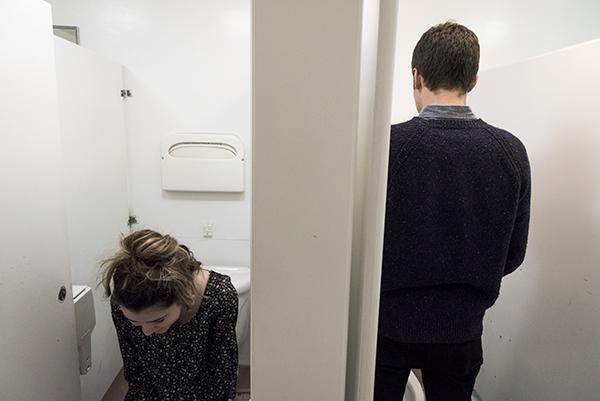In Light of North Carolina’s Bathroom Laws, NYU Students Revisit Policies of Gender-Neutral Bathrooms on Campus

With the recent events in North Carolina, NYU has taken a look at its gender inclusive efforts, such as gender neutral restrooms.
May 2, 2016
With the recent passing of House Bill 2 in North Carolina, which keeps individuals from using public restrooms that do not align with the biological sex written on their birth certificate, NYU students are taking a look at inclusivity on their own campus.
Although you might not have noticed, gender-neutral bathrooms can be located all over campus, from classroom buildings to residence halls.
The university also offers gender-inclusive housing for both upperclass undergraduates and graduate students. This housing option gives students the option to choose their own roommate groups according to their preferences.
For CAS sophomore Shannon Sullivan, a North Carolina native, the bill is a symptom of a larger cultural problem.
“I do not think anti-LGBT policy and behavior is exclusive to the south,” Sullivan said. “The fact that it’s a nationwide is pretty disturbing.”
Regarding the university’s efforts for gender inclusivity, Maggie Wilkinson, a Gallatin junior who’s also from North Carolina, expressed that NYU seems ahead compared to other schools.
“I’m proud to be part of a community that’s at least in the mindset of trying to be inclusive,” Wilkinson said.
For students looking for safe spaces on campus, the LGBTQ Student Center, located on the sixth floor of the Kimmel Center for Student Life, is a good place to start.
Lukas La Riviere, the program administrator at the LGBTQ Student Center, has been part of the discussion of gender inclusivity at NYU ever since he joined the Center in June 2015.
“It’s a conversation we’ve been having as an institution for many, many years now,” La Riviere said.
According to La Riviere, NYU tends to be ahead compared to other universities in terms of this issue but still has room for improvement.
For example, Sullivan mentioned her concern about the small amount of gender-neutral restrooms available in campus buildings.
“[NYU has] taken steps already to make sure that we show our support for the LGBT community, and not just vocally,” Sullivan said. “We just need to follow through with policy and having accommodations to make sure everyone is comfortable and feels safe being themselves.
La Riviere explained the university does enforce a non-discrimination policy among students, staff and faculty in order to make members of NYU community feel comfortable about their gender identity.
“The question that we’re having is, how can we even further make sure that it’s not just about using whatever restroom you want to use?” La Riviere said. “How can we make people comfortable using the facilities here, making sure our facilities are as accessible as possible to different gender identities?”
One of the difficulties in creating more gender-neutral and gender-inclusive facilities at the university is the city itself. For example, NYU does not own all the buildings on campus, which can slow making changes.
Among other NYU schools, Tisch has reached out to the LGBTQ Student Center for guidance regarding an increasing in the amount of gender-neutral and gender-inclusive amenities, according to La Riviere. He added that other departments and facilities contacted the Center as well, including Kimmel and Bobst.
“If we’re committed to this then we have to show up ourselves,” La Riviere said. “It’s not just on the administration to provide enough restrooms. We can’t control people’s own self-motivation to practice ally-ship. It’s really amongst the people.”
Email Yeho Hwang at [email protected].























































































































































